-
 Request a quote
Request a quote -
 Resource Library
Resource Library -
 Micron size guide
Micron size guideApplication Recommended
Sizing ( microns)Comments Cooling Tower Bleed-off / Blowd 5-55 Closed loop filtration 5-55 Tower Basin Cleaning / Sweeper Jet 5-55 Cartridge replacement 2-55 Protection of Heat exchangers 5-55 Consult with manufacturer Invasive Species 40-70 For larva removal Membrane Protection 70-300 Coal Ash 20-50 depends on process treatment train
Petrochemical and Power
PEP Filters manufactures and installs a wide range of filters designed to meet or exceed the needs of the Power, Refining and Petrochemical industries. You can count on PEP to deliver all your mechanical filtration requirements for the pre-treatment, processing, cooling, wastewater and reclaim applications. Whether your feed water is made up from seawater desalination, ground water, surface water or grey water, PEP Filters has the right filtration solution to maximize your plant’s uptime and performance.
-
+
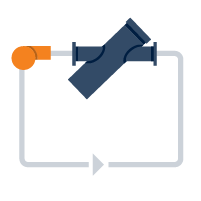
Closed Loop Filtration
Closed loop or chiller loop systems require filtration to maintain peak operating efficiency. While closed loop systems are not exposed to the high levels of dirt load and debris that are typically found in an open tower or condenser loop, it is still important to provide an adequate level of filtration and protection to the system.
A PEP Filter system should be installed into a chiller loop to protect the chillers, compressors, heat exchangers and other equipment from plugging and scale build up. By doing so one can rest assured that scale, corrosion, biofilm, dirt, iron oxides, and suspended solids will be removed to prevent long-term damage to the equipment.

Closed Loop Filtration
-
+
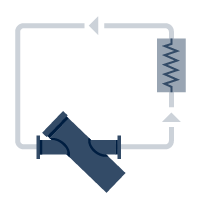
Heat Exchanger Protection
The process heat generated in industry is usually dissipated with plate and tube or plate and frame heat exchangers. Debris and scale can quickly reduce the efficiency of a heat exchanger. If neglected too long, the water treatment system will have to be shut down and the heat exchanger cleaned if it becomes too clogged which prevents the heat exchanger from performing as intended. In some cases, it is not even possible to clean the heat exchanger if it becomes too fouled. This is an unnecessary result that causes companies wasted time and money.
A properly designed PEP Filtration system will provide protection to the heat exchanger and help maintain a company’s uptime. Considering that a layer of scale that measures just 1/1,000-inch-thick can reduce the heat transfer process and increase energy costs by as much as 10%. The savings along can easily justify the cost of a self-cleaning PEP Filtration system.

Heat Exchanger Protection
-
+
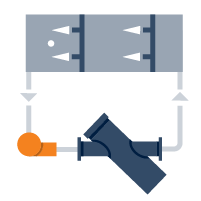
Sweeper Basin Filtration
Every cooling tower has a tower basin full of water underneath the tower assembly. The tower basin design is generally open to atmospheric conditions. Over time, debris will accumulate within the tower basin which will eventually affect the performance of the tower, water chemistry and lead to the eventual fouling of downstream equipment. If left unchecked, the basin will fill with sand, silt and other debris making it very difficult, tedious and expensive to remove.
PEP Filters Sweeper Jet system is designed to keep dirt and debris from settling out into the tower basin. Multiple nozzles are positioned around the tower basin to direct suspended solids to the intake of the PEP side stream filtration system. The filtration system then removes the solids keeping the cooling tower system free from damaging suspended solids and thus maximizes the performance of the cooling tower.
It is recommended that the PEP Filters Sweeper Jet System be designed into all new cooling tower filtration systems. It should also be retrofit into existing legacy cooling tower basins that were not originally designed with a sweeper jet system. The nozzles and optional pump assembly skid can be incorporated into other manufacturers side stream filter designed systems as well.

Sweeper Basin Filtration
-
+
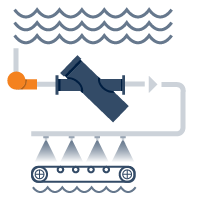
Make-up Water Filtration
Many industrial processes require make up water to compensate for losses caused by evaporation, overspray and leakage. Cooling towers represent a common example where makeup water is required to replace water lost due to evaporation, drift and blowdown. Make up water can come from the city, municipality, river, lake or well. No matter the water source Make up filters help to ensure clean water is being utilized to protect equipment and reduce maintenance costs. PEP Filters is also very effective at providing protection from invasive species such as zebra and quagga mussels.

Make-up Water Filtration
-
+
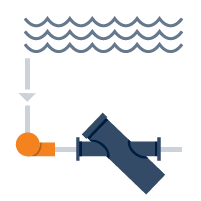
Intake Water Filtration
Intake filters are designed to do the heavy lifting of large or fine solids removal from an incoming water stream so that other polishing post filtration technologies can operate more efficiently and at less cost. Intake water can come from the city, municipality, river, lake or well.

Intake Water Filtration
-
+
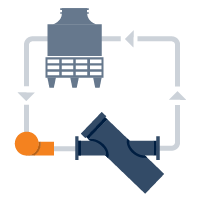
Cooling Tower Filtration
Cooling tower bleed-off/blowdown occurs periodically throughout the day to remove high concentrations of mineralized water from the tower due to evaporation. Scale formation occurs if the concentration of minerals in a cooling tower increases to a level higher than the saturation point of the system water. The mineral content above the saturation point will fall out of the solution of the water and form hard mineral scale throughout the system.
Incorporating a properly designed PEP Filtration system into a cooling tower helps to prevent scale and mineralization buildup within the tower by keeping dissolved solids and minerals in solution longer. As an added benefit, less chemicals and energy costs will be required to maintain the tower’s performance.
Consider this, a 500 ton tower running 24/7 will flush over 3.9 million gallons of water down the drain each year. This breaks down to approximately 10,800 gallons of waste per day or 7.5 gallons per minute. That is a lot of water and chemicals that could be reclaimed and used a little longer before it needs to be replenished.

Cooling Tower Filtration
-
+
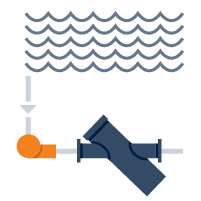
Seawater Intake Protection
Protecting critical equipment from sea water solids and biology is critical to the performance of today’s offshore platforms, desalination systems and power plants. Many of the applications that utilize sea water in their make up process incorporate PEP Filters as their membrane pre-treatment filter of choice. PEP Filters has a rich history of providing membrane protection. We encourage you to reach out to PEP Filters to learn more about our capabilities.

Seawater Intake Protection
-
+
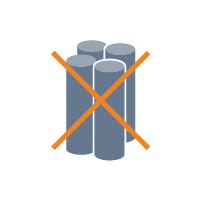
Cartridge Replacement
Cartridge filters are the razor blade business to the water industry. The capital cost for a cartridge filter system is relatively inexpensive from a capital cost point of view compared to other filtration options. That low-cost filtration system, however, does not look as good as it did when it was new several years down the road.
The operational costs of cartridge replacement, system downtime, the labor to change out the replacement cartridges and disposal costs will far exceed the cost of the initial investment and perceived savings one thinks they are receiving.
But wait just a minute. What if a properly designed automatic self-cleaning PEP Filtration system could provide the same or better performance as a disposable cartridge filtration system and save you money in a short period of time? A PEP Filter will automatically backflush and clean itself without the need to replace cartridges. Matter of fact, many customers install a PEP Filter ahead of their cartridge filters so that the PEP Filter actually removes most of the dirt load prior to the filter thus greatly extending the life of the disposal filter.

Cartridge Replacement
-
+
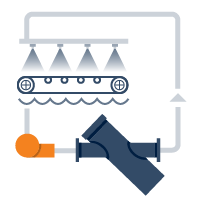
Process Water Filtration
Process water is used in the manufacturing process for multiple industries and segments to produce the desired products and services. Process water usually requires a finer degree of filtration and solids removal than the Intake Water entering a plant. PEP Filters manufacturers a complete line of automatic
self-cleaning mechanical filters to meet the most stringent process water requirements.

Process Water Filtration
-
+
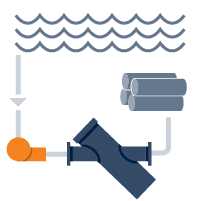
Membrane Protection
Membrane systems whether it be MF, UF or RO do the heavy lifting when it comes to producing quality water. Each system is expensive to purchase, operate and maintain. That is why more OEMs rely on PEP Filters and our other subsidiary companies around the globe to provide the vital pre-treatment to protect their membrane systems from fouling and maximizing their uptime performance. Whether it be for saltwater or freshwater protection, you can count on PEP Filters to deliver the best membrane protection in the industry.

Membrane Protection
-
+
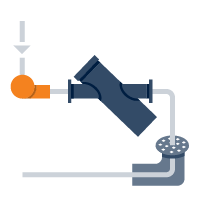
Wastewater Filtration
Wastewater treatment takes place at the backend of the plant. It usually involves cleaning up the waste streams from multiple sources like the Intake, Process and Cooling areas of a plant. Depending on the location of the plant there may be a variety of regulatory discharge limits that have to be met before
the wastewater can be released from the plant. PEP Filters has a complete line of automatic self-cleaning filtration equipment to help facilities meet their discharge limits.

Wastewater Filtration
-
+
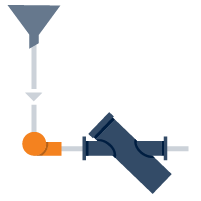
Reclaim Recycle
Water is a finite and valuable resource. Companies invest a significant amount of money to filter it, move it around and shape it into their product needs. It only makes sense that more wastewater is cleaned up and reused throughout any commercial, industrial, municipal or energy facility.

Reclaim Recycle
-
+
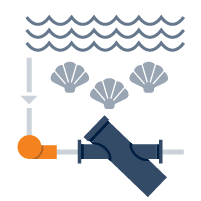
Invasive Species Protection
Over the last decade PEP Filters has experienced strong demand in the removal of invasive species from intake water systems. Invasive species can be made up of mussels, bacteria, plants, and other organic matter. Most companies are interested in the removal of quagga mussels and zebra mussels from their intake systems. Once these mussels make their way into the intake system of any plant or municipality, they quickly multiply and clog vital water streams. This could cost thousands of dollars in downtime and lost opportunity costs that could have been avoided all together with a properly sized PEP Filtration system installed in the front end of any water treatment system.
PEP Filters has an excellent reputation for preventing invasive species from entering one’s intake system. PEP Filters’ self-cleaning automatic filters are able remove larva from spreading throughout a water treatment system. Once the larva is removed, you can rest assured that you have taken significant steps from preventing the growth of quagga and zebra mussels from entering your plant’s water treatment system.

Invasive Species Protection
-
+
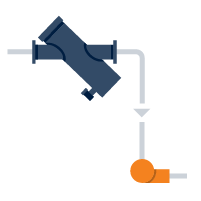
Pump Seal Protection
A good pump is designed to operate for many years. Unfortunately, pumps frequently come out of service due to product leakage from mechanical seal failure.
Contact seals commonly used on pumps wear at the point of contact or groove the shaft, rendering them ineffective in a short period of time. This allows lubrication loss and contamination ingress into the bearing housing. The resulting bearing damage causes axial movement and shaft deflection, which in turns causes the mechanical seal to fail. The end result is catastrophic bearing failure.
A properly designed PEP Filtration system installed prior to the pump will provide protection to the seal. As a general rule of thumb, PEP Filters recommends that a filtration level from 100-200 micron will provide the necessary level of protection to the pump. PEP recommends that one consults with their pump manufacturer to determine the proper filtration degree to provide pump seal protection.

Pump Seal Protection
-
+
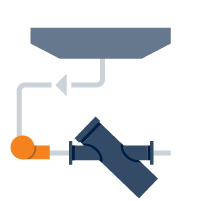
Coal Ash Cleanup
Coal fired power plants have been closing down in the US for the last few years. And PEP Filters has been involved in the coal ash cleanup process for several major power producers. Both our self-cleaning disc and screen filters have helped the power plants meet their discharge limits on their wastewater streams. We encourage you to contact PEP Filters if you have further questions about our coal ash clean up capabilities.

Coal Ash Cleanup
-
+
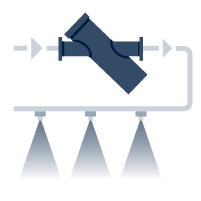
Nozzle Protection
Spray nozzles come in multiple shapes and sizes and they are used in many different applications, industries and market segments. Several examples of spray nozzles use include cooling, coating, cleaning, lubricating, humidifying, dust control, fire protection and irrigation.
In order for a spray nozzle to emit the proper pressure and spray pattern, it must remain clog free. This is where PEP Filters can assist. PEP Filters offers a wide variety of manual, semi-automatic and automatic self-cleaning filtration solutions designed to keep nozzles clean and operating at peak performance.
As a general rule of thumb, one should size a filter for nozzle protection by taking the nozzle hole size and dividing the pore size by a factor of 5-7. Utilizing this sizing parameter will ensure that the spray nozzle will remain clog free and perform as intended. For example, if the nozzle diameter is 200 micron the filter should be sized for 200 micron / 5 = 40 micron.

Nozzle Protection









